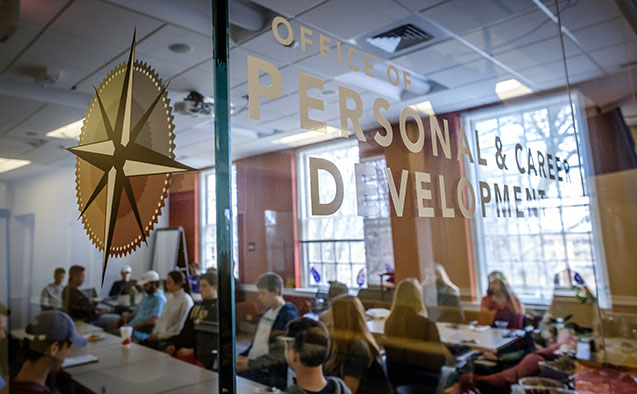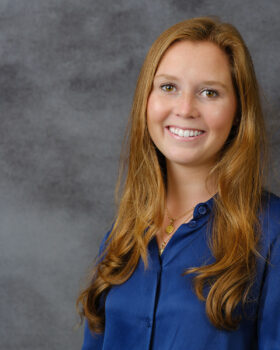Grads start early, embrace AI tools for job market success

During his freshman year, John Billos visited Wake Forest’s Office of Personal and Career Development to refine his resume. He met with career counselors, planned his summer internships and honed his networking skills. Senior year, he enrolled in one of Wake Forest’s half-semester, for-credit, career planning courses which helped him to think strategically about his career beyond his first job.

John Billos
“When I came to college, I was like, I need to get a job after college. I wasn’t thinking about when I’m 25, 30 or 35,” Billos said. “I’d like to be in charge of a startup, or launch a startup in a technical community in Silicon Valley or Seattle, but I didn’t have a plan in place that could move me towards that goal. Now I’m thinking more long term.”
Billos, who is from Mt. Airy, North Carolina, majored in computer science and math. After a summer internship with Microsoft, he was offered a full-time job.
For 2024 grads, the job search requires leveraging personal development, strategic networking, and innovative tools like AI to navigate the evolving job market.
A recent Bureau of Labor Statistics report found unemployment increased from 8.6% to 12.3% among 20-somethings with bachelor’s degrees between October 2022 and October 2023. Interest rates and new technologies are affecting hiring. Finding a job is more challenging than it was a year ago.
Traditional job search methods such as online applications and on-campus recruiting have been less effective for seniors seeking jobs. Wake Forest’s Vice President of Personal and Career Development Andy Chan said employers hire students who “show up’ by connecting their talents and skills to the organization’s needs.
“Organizations are hiring people, not paper,” said Chan. “They are looking for students who set themselves apart. Those who seek guidance from career counselors early and often learn how to identify and communicate their strengths in the employment market for their first jobs and for those that will follow.”
Network, network, network

Elyse Farrell
During her career search, Elyse Farrell had conversations with more than 150 professionals in her field of interest. “I had a giant, color-coded spreadsheet,” she said. “The most important question I asked was the very last one, which was always, ‘Who else do you think I should be having these conversations with?’ Once you do 2 or 3 networking calls, you have 12 more people to call. It’s the domino effect.”
Mercy Eyadiel, associate vice president and chief corporate engagement officer, said instead of career fairs and college visits, employers are leaning on technology and looking for potential hires to take the lead. “After the pandemic, in-person campus recruiting increased. However, this year there’s been a shift.”
The rise of virtual information sessions and AI-driven job-matching tools have empowered students to explore opportunities beyond traditional recruitment avenues.
“This puts more on the students to develop networks and be proactive in the job market,” said Chan. “It takes time to do the work. It requires more engagement and effort.”
For Farrell, who is from Roanoke, Virginia, her job with Booz Allen will provide opportunities to use her communication and bioethics majors in health care consulting.
Artificial Intelligence and the job search
Sociology and history major Ashani Davis plans to go to law school, but she’s planning to work for two years after graduation to learn more about the field. Davis, a first-generation student whose family immigrated from Jamaica, used AI for her research to land a job at Morgan Stanley Legal & Compliance in New York.

Ashani Davis
“It’s challenging to navigate the job market if no one in your family or social group is in an industry you want to get into,” said Davis. “I looked up job descriptions and the skills that were required. Then I connected the skills I learned in history and sociology classes – organization, attention to detail, and communication – to my application.”
AI is revolutionizing the job search, helping students to identify where their skill sets are sought in the workplace, and what kinds of skills are valued in different industries. Platforms like Chat GPT and similar virtual assistants act as connectors by finding industries and employers matching the job seeker’s skills and qualifications.
Students use AI to enhance resumes, generate cover letters and ideate, freeing up time to focus on other aspects of their job search. Eyadiel sees AI as an equalizer, especially for liberal arts majors.
“Students need tools and resources to succeed in a rapidly changing job market,” said Eyadiel said. “AI helps from an equity perspective, especially for underrepresented and first-generation students. It’s positively changing the world of recruiting and beyond.”
About OPCD
Wake Forest is a national leader in personal and career development. Preparing students for a career journey rather than the first job after college has been a top priority for over a decade. Students are introduced to OPCD and its resources during the first week on campus. Since 2010, the goal has remained the same, helping grads launch careers in both hot and cool employment markets.
Categories: University Announcements
Wake Forest News
336.758.5237
media@wfu.edu
Meet the News Team
Headlines
Wake Forest in the News
Wake Forest regularly appears in media outlets around the world.




